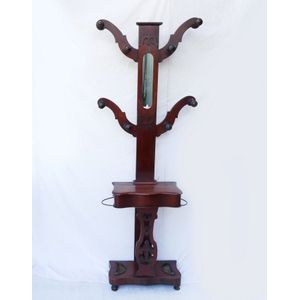Victorian Mahogany Tree Hall Stand
You must be a subscriber, and be logged in to view price and dealer details.
Subscribe Now to view actual auction price for this item
When you subscribe, you have the option of setting the currency in which to display prices to $Au, $US, $NZ or Stg.
- Column - An architectural feature sometimes used for decorative effect and sometimes as part of the supporting construction. Columns should generally taper slightly towards the top. They may be plain or decorated with carving, fluting or reeding. Columns may be fully rounded or, more commonly, half-rounded and attached with glue, screws or pins to the outer stiles of doors, or the facing uprights on cabinets and bureaux.
- Finial - An architectural decoration, found on the upper parts of of an object. On furniture they are usually found on pediments, canopies and shelf supports. On smaller ceramic or silver items, such as spoons, they may decorate the top of the item itself, or the lid or cover where they provide a useful handle for removal.
Finials have a variety of shapes and forms. They may be urn-shaped, baluster shaped round or spiral, but usually taper into an upper point. Many real life shapes may also be used as finials, such as pineapples, berries, pinecones, buds, lotus and acorns. Sometimes animals such as a lion are depicted, or fish and dolphins. - Turning - Any part of a piece of furniture that has been turned and shaped with chisels on a lathe. Turned sections include legs, columns, feet, finials, pedestals, stretchers, spindles etc. There have been many varieties and fashions over the centuries: baluster, melon, barley-sugar, bobbin, cotton-reel, rope-twist, and so on. Split turning implies a turned section that has been cut in half lengthwise and applied to a cabinet front as a false decorative support.
- Victorian Period - The Victorian period of furniture and decorative arts design covers the reign of Queen Victoria from 1837 to 1901. There was not one dominant style of furniture in the Victorian period. Designers used and modified many historical styles such as Gothic, Tudor, Elizabethan, English Rococo, Neoclassical and others, although use of some styles, such as English Rococo and Gothic tended to dominate the furniture manufacture of the period.
The Victorian period was preceded by the Regency and William IV periods, and followed by the Edwardian period, named for Edward VII (1841 ? 1910) who was King of the United Kingdom and the British Dominions and Emperor of India for the brief period from 1901 until his death in 1910. - Mahogany - Mahogany is a dense, close grained red-coloured timber from the West Indies and Central America. It was first imported into Europe in the the early 18th century and its use continued through the 19th century. It was popular for furniture making because of its strength, the wide boards available, the distinctive grain on some boards, termed flame mahogany and the rich warm colour of the timber when it was polished.. The "flame" was produced where a limb grew out from the trunk of the tree, and this timber was usually sliced into veneers for feature panels on doors, backs and cornices.
Some terms used to describe mahogany relate to the country from which it originally came, such as "Cuban" mahogany, "Honduras" mahogany etc. However unless the wood has been tested the names assigned are more a selling feature, rather than a true indication of the timber's origin.
This item has been included into following indexes:
Visually similar items

A Victorian mahogany four branch hall stand with eight turned coat pegs, central flap-top compartment and a pair of umbrella stands with original drip trays. Height 186 cm

Pair of William IV rosewood card tables, c. 1830, the rounded rectangular hinged tops opening to a red baize playing surface, raised on a column with acanthus leaf decoration, quatrefoil base with lion paw feet (2), height 92 cm depth 45 cm width 74 cm

A rare Australian cedar music stand with carved lion paw feet and lyre top, circa 1855, 130 cm

A cast iron umbrella stand, circa 1900, a shaped rectangular back with barley twist elements, supporting a vertical garland with a foliage embellished mascaron above fruits, flowers and ribbons, with a reeded rail to support umbrellas above a conforming ba
